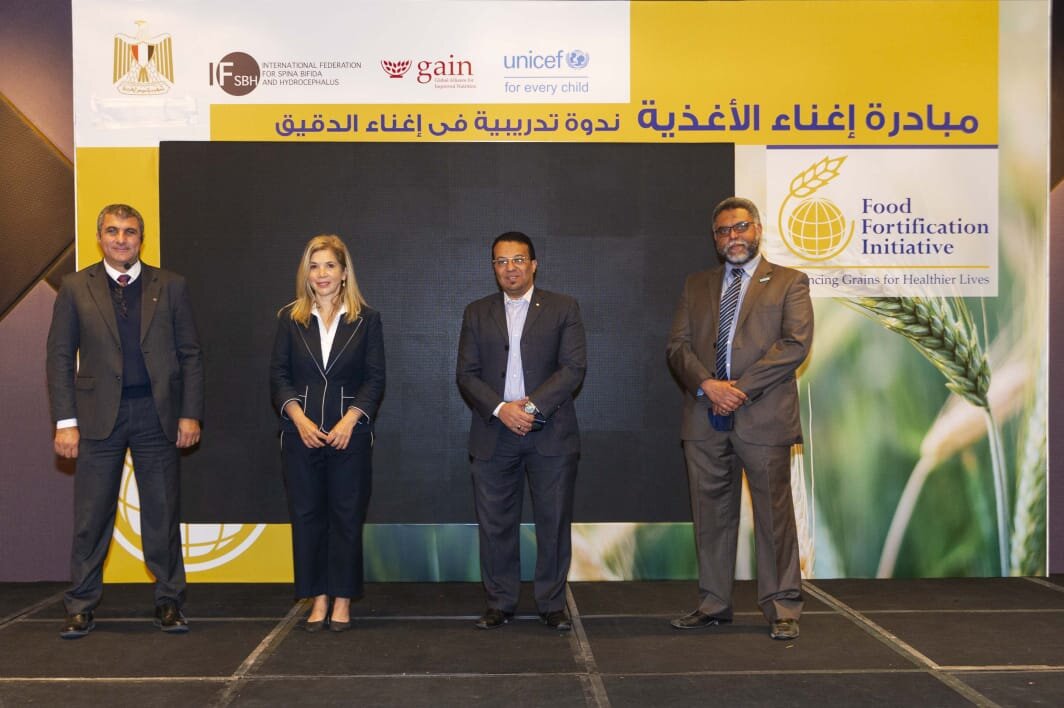FFI and UNICEF Host Workshop for Millers in Egypt
Photo: 4PR
Read the story in Miller Magazine.
The Food Fortification Initiative (FFI) and UNICEF held a flour fortification workshop for millers on 1 April 2021 to refresh and build miller capacity for fortification in preparation for a launch of the wheat flour fortification project. Using training modules crafted to specifically engage milling industry professionals, the workshop demonstrated how wheat flour fortification can have a tremendously positive impact on the health of millers, their families, their communities, and the country as whole.
The workshop brought together key stakeholders critical to restarting Egypt’s wheat flour fortification program including the Ministry of Supply and Internal Trade (MOSIT), Ministry of Health, National Nutrition Institute, National Food Safety Authority, millers from the public and private sector, The Food Holding Company, the American Chamber of Commerce, as well as development organizations. Experts in fortification and nutrition from MOSIT, FFI, UNICEF, and the International Federation for Spina Bifida and Hydrocephalus presented, and the Global Alliance for Improved Nutrition (GAIN) and USAID provided additional support for the training.
Fortification of flour with iron and folic acid is an ideal intervention as Egypt consumes approximately 17 million tons of wheat per year, making it one of the largest consumers worldwide. Since bread is Egypt’s main staple food consumed by the majority of the population, fortification of the baladi bread through the subsidy system, with iron and folic acid, is an effective strategy to address two pressing public health problems namely: anemia and neural tube defects. Mandatory flour fortification, which requires both publicly and privately milled flour to be fortified, will enable 90% of the Egyptian population--approximately 90 million people--to receive needed vitamins and minerals through the consumption of fortified wheat flour products to lead a more productive and healthier life. Flour fortification can significantly reduce the current levels of anemia in Egypt, which is over 20% in women and 27% in children under 5 according to the latest Demographic and Health Survey. It can also reduce the prevalence of neural tube defects, which is 3 times higher than the global rate. Implementation of mandatory flour fortification on a national scale is a vehicle that has the potential to significantly improve Egypt’s health status and overall productivity, at minimal cost with maximum impact.
The initial flour fortification project that took place in Egypt was launched in 2008 and continued until 2014, where flour was fortified with iron and folic acid, through the subsidy system, and reached approximately 50 million Egyptians. The Government of Egypt engaged FFI in 2019 to provide technical assistance to restart the fortification program. Since FFI began working in Egypt, it has worked with partners to conduct an assessment to map opportunities and challenges, build a coalition of stakeholders to implement fortification, and provide technical assistance to implement a fortification program that will reach the majority of Egypt’s population.
Established in 2002, FFI helps country leaders around the world plan, implement, and monitor fortification of industrially milled grains so people have the nutrition they need to be smarter, stronger, and healthier.


